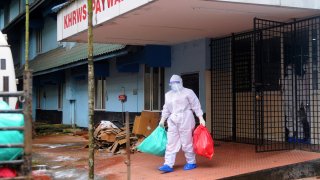
The southern Indian state of Kerala is quickly ramping up efforts to stop a potential outbreak of the deadly Nipah virus, even as the state continues to battle the highest number of coronavirus cases in the country.
Kerala is on high alert after a 12-year-old boy died of the rare virus on Sunday, spurring health officials to start contact-tracing and isolating hundreds of people who came into contact with the boy, who died at a hospital in the coastal city of Kozhikode.
On Tuesday, the state health minister told reporters that the samples of eight primary contacts have come back negative.
“That these eight immediate contacts tested negative is a great relief,” Veena George said.
Get San Diego local news, weather forecasts, sports and lifestyle stories to your inbox. Sign up for NBC San Diego newsletters.
George said that more samples will be tested on Tuesday and that a total of 48 contacts, including the eight that have tested negative, are being monitored at a hospital. Officials will also be carrying out door-to-door surveillance and identifying secondary contacts.
Here's everything you need to know the deadly Nipah virus spreading in India, what causes it, symptoms and how it can be treated.
What Is Nipah and where did the virus originate?
U.S. & World
Nipah is a zoonotic virus, meaning that it initially spreads between animals and people, according to WHO. It is found in fruit bats and pigs, and those infected animals can spread the disease to other animals and humans.
It was first identified during a late 1990s outbreak of disease in pigs and people in Malaysia and Singapore. Nearly 300 human cases were reported and more than 100 people died. It also had a substantial economic impact as more than one million pigs were slaughtered to help control the outbreak.
The virus has an estimated fatality rate of between 40% and 75%, according to the WHO, making it far more deadly than the coronavirus.
The India state of Kerala dealt with a Nipah outbreak in 2018, when more than a dozen people died from the virus.
How does Nipah virus spread?
Nipah can spread from infected animal to humans or through human-to-human contact, raising concerns about the potential for Nipah to cause a global pandemic. According to the CDC, transmission to humans can occur by one of three ways:
- Direct contact with infected animals, such as bats or pigs, or their body fluids (such as blood, urine or saliva)
- Consuming food products that have been contaminated by body fluids of infected animals (such as raw date palm juice or sap or fruit contaminated by an infected bat)
- Close contact with a person infected with Nipah or their body fluids (including nasal or respiratory droplets, urine or blood)
The Nipah virus strain identified in the 1999 outbreak in Malaysia appeared to have been transmitted initially from bats to pigs, with subsequent spread within pig populations. Then people who worked closely with infected pigs began falling ill. No person-to-person transmission was reported in that outbreak, according to WHO.
In the 2018 outbreak in Kerala, India, health officials said while they believe the outbreak began with someone infected somehow by a fruit bat, every subsequent infection came from human-to-human contact, sometimes passing to relatives or medical workers caring for the sick.
What are the symptoms of Nipah virus?
Nipah infection can range from asymptomatic to mild and severe disease to death.
Common symptoms are fever, headache, cough, sore throat, difficulty breathing, vomiting, seizures, convulsions and brain swelling, and appear in four to 14 days following exposure, according to the CDC.
Infections can also lay dormant, with symptoms and sometimes death appearing months or years after exposure.
Can Nipah virus be treated or cured?
There is currently no vaccine or drugs for the virus. The only treatment is supportive care to control complications and keep patients comfortable.



